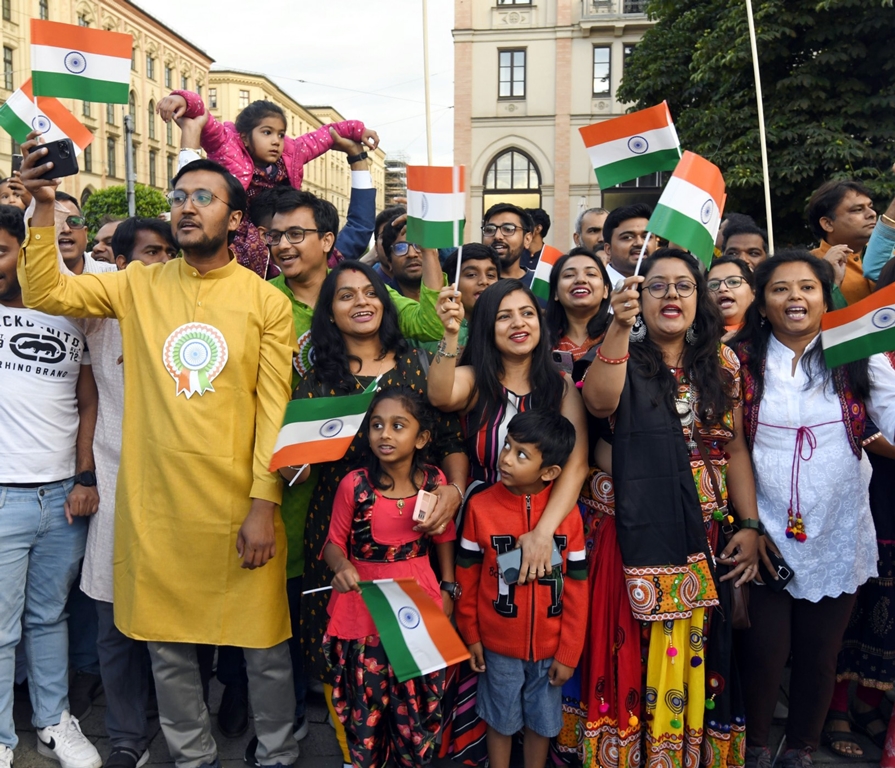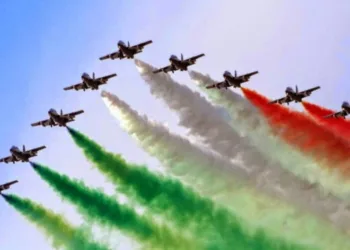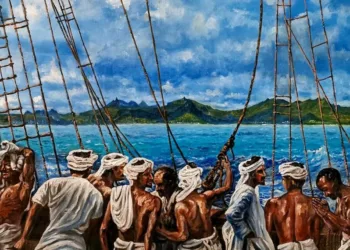Commemoration of 75 years of India’s independence or – to put it in official parlance – Azadi ka Amrit Mahotsav is a celebration of the ageless glory and diversity of Indian culture and the progress the nation has made in the economic, social and political spheres. How do Indian communities abroad feel about it all? Pravasi Indians spoke to some NRIs to get a feel of their perspectives on this emotive issue…
BY PARSA VENKATESHWAR RAO JR
What Indian emigrants feel about the homeland provides a good reality check for the country. There is the advantage of distance which offers a clear perspective about what the homeland is like, a mix of pride and nostalgia. The paradox is this: Indians continue to emigrate for better opportunities and living conditions. They long for India but find it difficult to come back. They will not get the kind of high-paying jobs they are holding or profitable businesses they are running in foreign lands. But they are attached to India through family, friends, sentiment, Bollywood songs. They have moved away from India, but they have not turned away from the motherland. They hold on to memories, and they keep up with Indian culture and traditions in their foreign homes. The cliché that you can take them away from India, but you cannot take India from them holds true.
It is a fact that emigrant Indians are a minuscule minority and their views do not reflect what India is all about. Theirs is a microcosmic point of view. But it is not a view that can be dismissed as of no consequence. Indians abroad have been sending money home, and their remittances contribute to the foreign exchange reserves in India. Gradually, they save money in Indian banks, either in rupees or dollars. And then they begin to invest in India. They have contributed to India’s economy and India’s global image. And it has not been an easy choice. They struggled with India’s insignificance and their own. And through their own efforts, they improved their lot, and helped in burnishing the country’s image.
While India struggled through its fractious society with its caste, communal and regional strife and kept Indian democracy and freedom alive and meaningful, the small band of NRIs struggled too to help themselves and the country. And they succeeded even as India did. Their views and experiences make sense in understanding India a wee bit.

When Nitin Dalvi moved to the United States in 1976, he recalls: “India did not figure in the thinking of the national media, much less the ordinary American. It was still seen as an exotic place with all the cliches of cows, elephants, poverty, hippies, gurus, etc.” In the mid-1960s the Beatles came to India, learnt the sitar from Pandit Ravi Shankar, and then came again to the ashram of Mahesh Yogi at Rishikesh to learn yoga and spirituality. Many of us in India thought that India was getting famous, but it was quite different on the ground in America.
When Kavita Grover moved to Dubai in 1994, the perception was not very different. India was seen as a poor country and Indians were seen as fleeing the harsh conditions. Grover writes, “The general perception was that India is a developing country from where you can hire Indians cheaper compared to a European, even a South African. They are good workers and don’t complain of long hours.”
But the mood and perception changes dramatically when Pratibha moves to Canada in 2021. She says, “I came to Canada, and I found Indians celebrating all festivals with full enthusiasm and spirit. People who are living here miss India and they are trying their best to impart Indian values to their children.”
The more interesting aspect of the emigration story is that Indians stay deeply connected with the country. There is indeed hyperbole about their feelings for India but there are compelling reasons for keeping in touch with India. It is the family. Srikant Avatapalli, who moved to Singapore in 2003 to work with an Indian tech company there, compares notes about what it was like in 2003 and in 2022. In his memo-like response, he makes brief pointers of what it was like in 2003: “Expensive flight tickets made travel home less frequent, causing gaps in family bonding.” And there was another reason too: “Even though expatriates wanted to come back they missed the lifestyle they enjoyed abroad.” And the changes he notices in 2022: “Many of the NRIs moving to India are able to maintain the lifestyle they got used to abroad and remain closer to family and friends.” The NRIs have paid a price, in emotional and social terms. And he notes with sadness and satisfaction that in 2022, “NRIs are closer to Indian culture, kids are learning Indian dance and arts.” Keeping alive Indian culture though consciously away from the homeland does not give the same joy as living the culture at home.
When the NRIs wax eloquent about their emotional connect with India, it hovers between the banal and hyperbole, but it shows a desperate longing. Says Divya Kaeley, who migrated to Canada in 2012: “India was ‘home’ and will always be. I have my extended family back home and this keeps my connection with India going strong.” Neelam Verma, who left India in 2002 for Canada, says, “All my relatives, including my mother and brother and their families, are in India. I travel to India every year to meet with them. We still practise our culture at home and among friends and children. Our roots lie in India which cannot be uprooted, come what may.” There is an uneasiness hovering in those sentences, the emotional price that the NRIs are continuously paying. Beyond the glitz and comfort of lifestyles abroad, Indians miss the cultural bonding that holds them together at home.
That the NRIs miss India is writ large in their views when asked about their connection with India. Says Rajat Jain who left for Australia in 2004: “I go back to India every year (except the last two years due to Covid) to see my family and friends. I also overdose on food, traffic, news channels, Bollywood, shopping malls and free unsolicited advice from an alarming number of people on everything. It is my annual pilgrimage home to reset and refresh my perspective on everything.”
There is a sense of loneliness and longing that seems to forever haunt the much envied Indians abroad. So, when they express their view on what independent India means to them, they express an idealism which they may not be aware they nursed. Says Venkatesh Raghavendra, a social entrepreneur based in the US: “A land where everyone has equal access to opportunities and enjoys basic aspects of sustenance—safe water, food security and dignity.” Neelam Verma is quite categorical: “Independent India for me is the freedom to practise your culture, religion, and travel to any part of the country without restrictions.” Pratibha is quite blunt about what independent India means for her: “Independent India means we can be without fear and that there is no corruption. Hard working people should get their due. The worst things are corruption and lack of respect for women. I found women are much stronger and independent in other countries which makes me stay in Canada.”
The sentiments express a dream, an ideal, with the implication that despite 75 years of independence, these goals and ideals remain to be achieved.
The NRIs are aware that they have left behind a country beset with problems, many of which defy solution. And they know that they have not found a paradise in the foreign country. Unlike the people of German, Polish, Ukrainian, Greek and Italian origin in the United States, Canada and Australia, who have left behind the home country and do not look back to it, the Indians who have left India find themselves tied to their homeland. Perhaps after a few generations, Indians will not feel the agony of weakening cultural roots. The Indians who continue to live there will live like Americans, Canadians, and Australians. But now Indians are struggling to keep alive the culture they have left behind, the family connections that are loosening by the day.
As India celebrates 75 years of independence, Indians abroad want to be part of the celebrations and feel the thrill but they know that they are far from home, and that they are not any more part of the daily struggle one billion-plus Indians undergo, fighting to survive another day. The idealism of the Freedom Movement has dimmed and even vanished as the heroic past recedes into the background. But the NRIs seem to keep the fire of idealism alive when they speak of what they perceive to be independent India. In the words of Lakshman, who left India for the US in 2013, “Independent India means a country that is not afraid to stand up for what is right. A country that is self-sufficient and values itself and does the right thing. A country that has a system of democracy and is progressive.”
The writer is a New Delhi-based journalist who has worked with The Indian Express, India Today, Gulf Today (Sharjah), The Straits Times (Singapore), tehelka.com and DNA.








